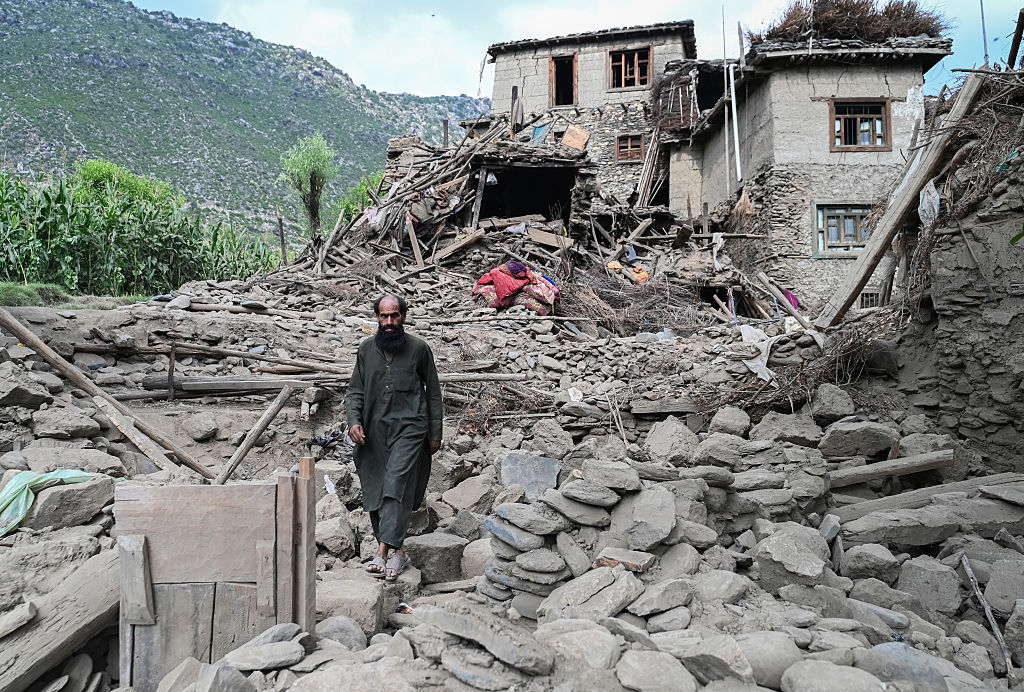More than 800 people have been killed, and thousands more injured, as of Monday evening after a magnitude-6 earthquake struck eastern Afghanistan late Sunday night. With the epicentre around 27km away from Afghanistan’s fifth-largest city, Jalalabad, the capital of Nangarhar, heavy tremors were felt as far as Kabul, around 130km westwards, and also eastwards in Pakistan’s capital Islamabad. The death toll is expected to rise ominously, with entire villages collapsing in Nangarhar’s bordering Kunar province where much of the rugged region is difficult to access, amid relief teams’ best efforts to reach the worst-hit sites in time. In 2022, a 6.2-magnitude earthquake in eastern Afghanistan killed at least 1,000 people, with more than 7,000 killed as a result of earthquakes in the country since 2012.
The latest calamity has come a fortnight after the Taliban completed four years in control of Afghanistan following the departure of US and Nato forces in 2021, signalling the return to power of the jihadist group after two decades. Since 2021, Afghanistan’s economic and humanitarian crises have surged, with the gross domestic product shrinking by a quarter in the first couple of years, hiking the unemployment rate, pushing millions into poverty and leaving nearly a third of the country undernourished. Women have been affected by these crises to a prodigiously greater degree, with a mere 7 per cent of the female population gainfully employed outside their home, as the Taliban implemented bans on secondary education for girls, limited their access to healthcare facilities, and enforced restrictions on them even walking or speaking in public. It is evident that this erasure means that women are more vulnerable to the after-effects of Sunday’s earthquake, with reports already coming in that men are being prioritised at local hospitals treating the victims.
Much of the Taliban’s anti-women policies are rooted in their strict imposition of Islamic sharia. In a throwback to their previous rule, the Taliban announced their takeover in 2021 by hanging dead bodies as a warning to those who wished to defy their rule, resuming public executions and near-daily floggings for ‘crimes’ such as adultery, eloping and homosexuality. Immediate sanctions were imposed on the Taliban regime in 2021, with the US Federal Reserve freezing around $9.5 billion worth of central bank assets, global organisations such as the International Monetary Fund and the World Bank halting programmes, and various western donors cutting aid.
While these sanctions aggravated the economic predicament, the Taliban’s reaction to western condemnation of its treatment of women has been to intensify its grotesque Islamist policies, including forced conversions and restrictions on females unaccompanied by male guardians. Even healthcare professionals have been asked not to treat unaccompanied women, a policy some would still be following amid the ongoing disaster relief efforts, still reeling under the fiscal and infrastructural hurdles self-imposed by the Taliban’s gory sharia rule.
In addition to the humanitarian challenge intensified by the jihadist group’s disregard for fundamental human rights and sidelining of half the population from the economy, the crises in Afghanistan have also been mounted by the influx of refugees from neighbouring Iran and Pakistan, with up to 1.6 million evicted by these countries. Both Tehran and Islamabad have accused the Afghan refugees of being a security risk, with the latter even launching airstrikes on Afghanistan’s eastern territory last year, claiming that the regime in Kabul provides sanctuaries to the Pakistani Taliban.
However, despite these regional conflicts, the Afghan Taliban managed to win India’s diplomatic interest as a counterbalance against Pakistan, wooed Chinese investment, and even got Russia to become the first country to recognise the jihadist regime in July. While Russia’s move would also encourage other aligned countries, especially those in Central Asia, to recognise the Taliban, the jihadist group is fully aware that much of its fiscal needs, including those emerging in the aftermath of Sunday’s earthquake, are likely to be met by the western states.
In this regard, the Taliban have recently been looking to use bargaining chips to earn western legitimacy, such as threatening the lives of spies who worked for the UK government in Afghanistan, many of whom were listed in a data breach featuring around 19,000 Afghans.
The Taliban are likely to use Sunday’s earthquake to make humanitarian demands, similar to their pleas after the 2022 earthquake. ‘The Islamic Emirate is asking the world to give the Afghans their most basic right, which is their right to life and that is through lifting the sanctions and unfreezing our assets and also giving assistance,’ the Afghan Taliban spokesman Abdul Qahar Balkhi had said three years ago. The group, which is brutally suppressing the basic rights of half its population, and exercising relentless violence against those dissenting from their bloodthirsty Islamic rule, implores that basic rights be granted to those very people it mercilessly oppresses. This is precisely the argument that echoes in western power corridors.
Indeed, despite the sanctions, the vast majority of the $6.7 billion in aid that Afghanistan received since the return of the Taliban until the end of last year was contributed by western states, with the US accounting for 43 per cent of all humanitarian funding in 2024, nearly $750 million donated last year. While the Donald Trump government has significantly cut down aid for Taliban-run Afghanistan this year, the US and other western powers are likely to be pushed to reconsider their aid cuts, even though there have been multiple reports highlighting how the Taliban have appropriated much of the foreign aid. The US government’s oversight authority, the Special Inspector General for Afghanistan Reconstruction, published its latest report last month estimating that merely 30 to 40 per cent of funds actually reach the Afghan population, owing to multiple layers of Taliban diversion, which include bribery, extortion and threats.
Any foreign aid that is delivered to Afghanistan, which will now be requiring even more support to battle the shocks of Sunday’s earthquake, should undergo rigorous regulatory and audit procedures to ensure that it is those who are vulnerable – most notably the women and girls – who actually receive the funds. Failing that, all the money that the Taliban manage to divert will inevitably be used to pile on the misery for the people of Afghanistan.







Comments